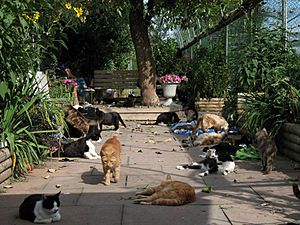Regional Animal Protection Society facts for kids
 |
|
| Founded | 1989 |
|---|---|
| Type | non-profit charity |
| Focus | No kill animal sheltering, trap-neuter-return |
| Location |
|
|
Area served
|
British Columbia |
|
Revenue
|
$6.16 million in 2023 |
|
Employees
|
65 full-time, 32 part-time in 2023 |
|
Volunteers
|
550 |
The Regional Animal Protection Society (RAPS) is a special organization in Richmond, British Columbia, Canada. It's known as a no-kill animal rescue group. This means they work hard to save animals and find them loving homes, without putting them down unless it's absolutely necessary due to severe suffering.
RAPS runs Canada's largest cat sanctuary, a network where volunteers care for animals in their homes (called fostering), and thrift stores that help fund their work. They also have the RAPS Animal Hospital, which is a full-service clinic for pets.
RAPS started in 1989 as Richmond Homeless Cats. It became a registered non-profit in 1995. Over the years, its name changed to Richmond Animal Protection Society and then to Regional Animal Protection Society in 2017. This last name change showed that their help reaches beyond just Richmond.
Contents
How RAPS Began
RAPS was founded in 1989 by Carol Reichert. Back then, it was called Richmond Homeless Cats. It was the first group in Richmond to help feral cats. Feral cats are wild cats that live outdoors.
At that time, many feral cats were quickly put down if they ended up in animal shelters. RAPS volunteers started a program called trap–neuter–return. This means they would humanely catch feral cats, have them spayed or neutered (so they couldn't have more kittens), and then release them back where they were found.
They also helped tame feral kittens and found homes for tame cats. Volunteers set up 43 feeding stations for feral cats every day in Richmond and south Vancouver.
Growing to Help More Animals
In 1999, RAPS received a donated space for a shelter. This became the first cat sanctuary. To help reduce the number of homeless pets, RAPS also helped pay for spay/neuter surgeries for pet owners who couldn't afford it. They also helped people find lost pets and offered advice for pet behavior problems.
RAPS wanted to stop animals from being put down unnecessarily. In 2006, they applied to run the city's animal shelter. On February 1, 2007, RAPS took over the City of Richmond animal shelter. They immediately started a no-kill policy for all animals, no matter their age, health, or if they were easy to adopt.
RAPS has shown that a no-kill approach works. They have found safe and loving homes for hundreds of animals. Carol Reichert, the founder, retired in April 2014 after 25 years of helping animals.
The No-Kill Promise
RAPS is a no-kill organization. This means they promise that no animal in their care is ever put down because there isn't enough space, or because of a treatable illness, a physical problem, age, or behavior issues.
Animals are only put down in very sad situations. This happens if they are in terrible pain with no chance of getting better. Sometimes, if a court orders it because an animal has been declared dangerous, RAPS might have to put an animal down. This is very rare.
Helping Stop Pet Store Sales
RAPS worked with the city of Richmond to ban the sale of rabbits and dogs in pet stores.
The sale of rabbits was banned on April 1, 2010. A city leader said that banning dog sales would help send a message to "puppy mills." Puppy mills are places that breed many puppies in poor conditions. The ban also aimed to reduce the number of dogs given up to shelters. RAPS had noticed many dogs bought from pet stores were later given up when they grew out of the cute puppy stage.
The ban on dog sales started on April 30, 2011. Pet stores tried to fight the ban in court, but RAPS and the city won.
The Cat Sanctuary
The RAPS Cat Sanctuary is a special place for cats. It's located on six acres (about 2.4 hectares) of land. Some people have called it "Club Med for cats" because it's such a nice place for them.
The sanctuary has two large buildings and twelve smaller ones. There's a special house just for kittens. There are also two houses for cats with feline immunodeficiency virus (FIV) and another area for cats with feline leukemia virus (FeLV). These are cat diseases.
The main buildings have enclosed decks. This lets indoor cats get fresh air and sunshine safely. There are also fenced outdoor yards and cedar cottages. These provide a safe home for over 200 cats who prefer to live outdoors.
At one point in the early 2000s, the sanctuary was home to more than 800 cats! In 2014, about 640 cats lived there. Around 100 volunteers help take care of them. A special team of animal care workers watches the cats' health. They are trained to handle and give medicine to even feral cats. They also work closely with local veterinarians.
The cat sanctuary gets its money from donations from people and from the sales at the RAPS thrift store.
 | May Edward Chinn |
 | Rebecca Cole |
 | Alexa Canady |
 | Dorothy Lavinia Brown |

